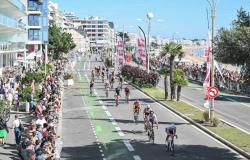
One day, in need of confidences – which is apparently not very usual for him – Didier Migaud confided to our colleagues at Capital magazine about his childhood in Château-Chinon. His father, a notary, had become friends there with a certain Mitterrand, then mayor of the small town in Nièvre: “I was 13 years old during his first presidential election, in 1965; I defended him in the schoolyard,” he said in 2014.
Of Touraine, which he left at a very young age, he certainly and inevitably has fewer memories, but it was indeed in Tours, or more precisely in Saint-Symphorien, at a time when the commune was not yet attached to the main town, that the new Minister of Justice was born, in June 1952. Jean-Patrick Gille from Tours remembers learning about it when the two men, both MPs at the time, crossed paths in the corridors and on the benches of the Palais Bourbon.
“Passionate about financial matters”
Because the career of the new Minister of Justice was first and foremost political, with a left-wing leaning: he was notably president of Grenoble Alpes-Métropole and deputy for Isère from 1988 to 2010, with the presidency of the finance committee in the Assembly as the cherry on the cake.
So what is he doing in a right-wing Barnier government? Will he serve as a (small) “left-wing guarantor” when everyone else has said no?
The man, clearly, “had somewhat cut ties with politics, he was someone who was above all passionate about financial issues,” remembers Jean-Patrick Gille.
He had certainly already shown his “Sarko-compatibility”: it was the former President of the Republic who appointed him to head the Court of Auditors in 2010, the date on which he left both politics and the PS. He did not seem “Macron-incompatible” either, knowing that it was the current Head of State who installed him as President of the High Authority for Transparency in Public Life in 2020.
“What is he going to do in this mess?”
However, “We wonder what he’s going to do in this mess,” summarizes Jean-Patrick Gille about his entry into the Barnier government: “This government is still a paradox: it is those who lost, who refused the republican pact, who will find themselves in control.”
The senator from Indre-et-Loire, Pierre-Alain Roiron, who, twenty years ago, frequented the same socialist circles as Didier Migaud, notably around Laurent Fabius, says in the same way his “surprise”: “I am surprised because this government does not correspond to the ideas that he defended during a period of his life. I did not expect him to come back like this on the political scene.”
“We’ll see what he does.”
Do (politician) men change? The two elected officials from Tours both say they hardly know the new minister: “We’ll see what he does,” Senator Roiron tempers: “For justice, particularly on minimum sentences.”
The latter, introduced under Nicolas Sarkozy before being abolished, assume irreducible sentences for repeat offenders. Éric Dupond-Moretti, the last Minister of Justice, had refused to reinstate them, considering them ineffective in the fight against delinquency. But the National Rally has already said that it would request their reintroduction, and we know that some new ministers, including that of the Interior, Bruno Retailleau, are in favour of them. What will the ex-socialist Didier Migaud do? “If he were to reinstall them, I would be revolted,” concludes Pierre-Alain Roiron.
“A classic communication operation”
What does Laurent Baumel, a brand new socialist MP, think of a former man from Tours, a former MP, a former socialist, who is joining the Barnier government?“Didier Migaud does not represent the left, he only represents himself. We are reduced here to a classic communication operation which consists of promoting the career of someone, in this case on the left, to make people believe that this government is not only on the right.” But for the deputy from Chinonais, there is nothing that matters: “For me, the die has been cast since the nomination of Michel Barnier, from a party that came fourth in the legislative elections and which did not even call for a republican front: it is a denial of democracy that justifies censorship.”





